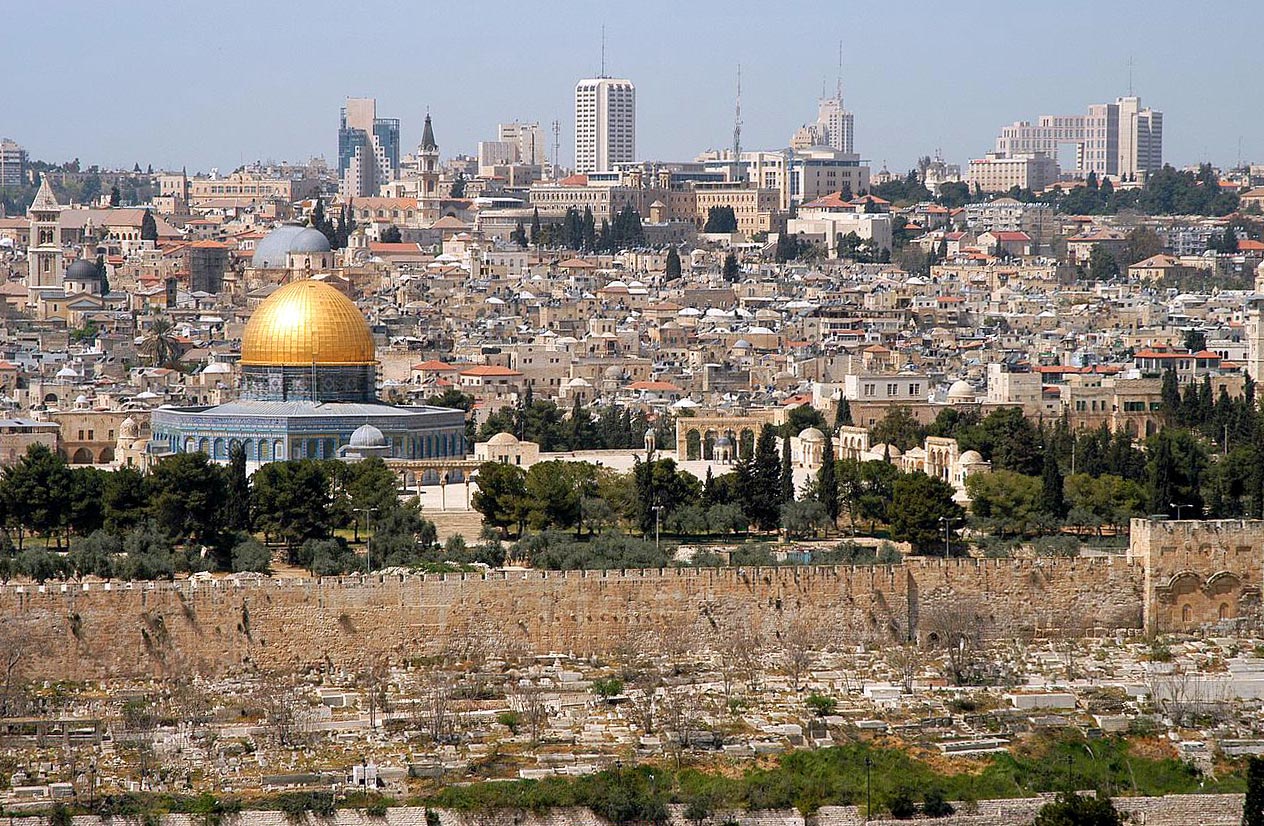Close your eyes for a moment and try to visualize the land of Israel. What do you see? Do you see a land that is mostly flat and arid? Do you see trees? There is a Christmas hymn that goes "Far, far away on Judeas Plains, shepherds of old heard the joyous strains. . . ."
We arrived in Tel Aviv on the afternoon of April 12, 1999. After going through customs we met other members of our tour group and got on a tour bus for the trip up to Jerusalem.
Up is right. Ben Gurion Airport and Tel Aviv are on the coastal plain and Jerusalem is about 2,000 feet above sea level. As we drive across this coastal plain I see farmland and trees everywhere. I saw more trees than I had anticipated. Oh, what a beautiful country!
The previous night was spent over the Atlantic ocean, and try as I might, I could not sleep; now, as I desire to see as much of the countryside as I can the lack of sleep is catching up to me. I fight it all I can, I nod off but spring awake trying to see as much as I can. I keep nodding off and forcing myself awake as we begin the climb from the coastal plain. As we enter Judea the landscape is changing. It is no longer flat, and there are fewer trees, as we find ourselves among the seven hills that make up the modern city of Jerusalem.
After fifty-five minutes we arrive at the Hyatt Regency, on a hill north of the Old City. From windows in the expansive lobby we can see the Dome of the Rock and and the temple mount. I am really here! Dinner at seven, followed by journal writing, and then my twenty-eight hour day is done. Early to bed, for early we were to rise the next day.
The land of Israel is very small; about sixty-five miles wide and about 200 miles long. If you get out a map of the United States, go the the western part of the country and find the state of Utah; you can imagine three lands of Israel sitting comfortably inside its borders.
There are virtually no natural resources, no gold or silver. The feisty Golda Meir, one time Prime Minister of Israel, once chided Moses, "He traveled the wilderness for forty years and then settled the one spot that had no oil!" Yet the land has been conquered many, many times -- almost thirty different times by at least nineteen different peoples. Why, if there are no natural resources? Because the land was the crossroads of the East.
Meanwhile the Jews and Arabs, who have experienced these various conquests are still there, having survived, submitted to, or eventually overthrown the conquerors. The Jews and Arabs view this land as their home. Yet no legitimate Jewish or Arab government has called it exclusively their own. For the most part they have coexisted for centuries.
Contrary to popular perception the majority of Jews and Arabs desire to live peacefully with each other. Perhaps it is like the colonists during the American Revolution -- one third in favor, one third opposed, and one third indifferent -- one third knowing and peacefully living amongst each other, one third bitterly opposed to living amongst each other, and one third pulled between the other two thirds.
The geography also provides many contrasts. Israel is a land of ocean, seas, plains, forests, deserts and mountains. It is green and there is water. It is a good land, where Jews, Moslems, and Christians raise their families. Most of them agree the land is ripe with a feeling of peace and youthful energy.
This was in 1999, before the peace process fell apart, before the violence rose to take center stage. The modern state of Israel has had to contend with terrorism for most of its seventy year history. Even so, in 1995 Israel had less violence (crime) than Salt Lake City, Utah, did. Until the collapse of the peace process the terrorism and violence were but isolated incidents.
At least, this was the perspective of our tour guide. He was born of Jewish parents in Haifa in 1941. After a divorce his father took him to the United States. While there father and son joined the Church of Jesus Christ of Latter-day Saints - not converted, mind you, for they still had their Jewish heritage. In the 1970s our guide returned to live in Israel and start a tour company. Over the years he has developed friendships and business relationships with Arabs, Jews and Christians.

No comments:
Post a Comment